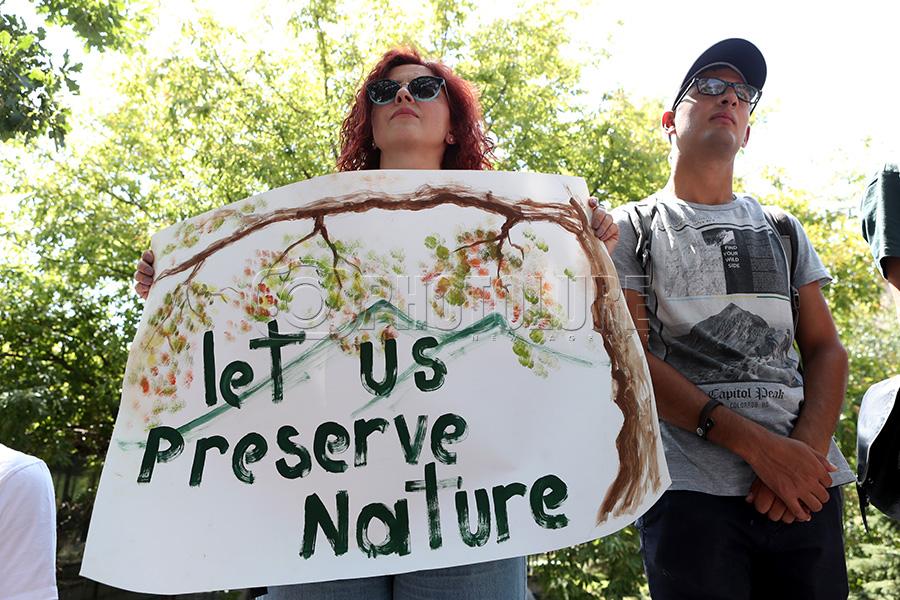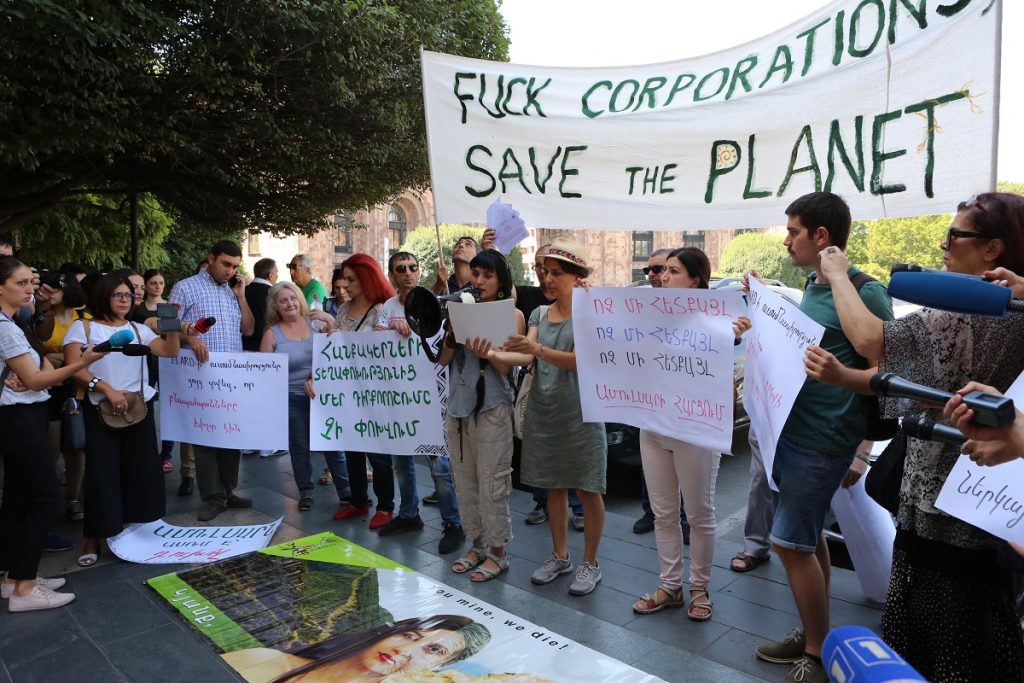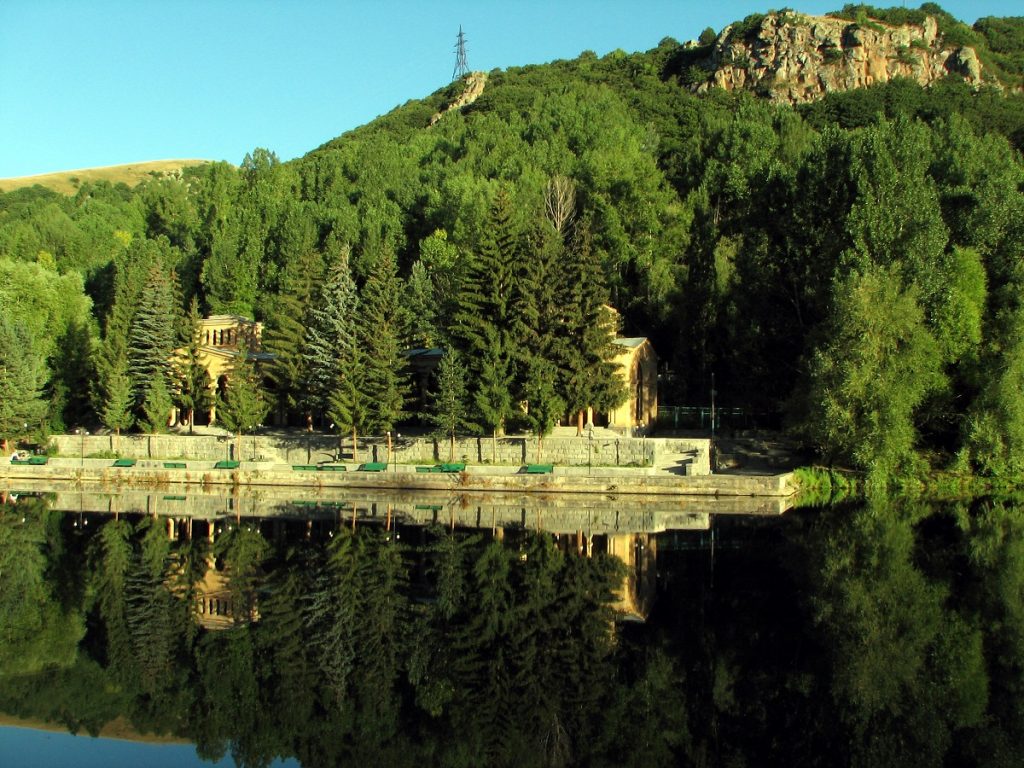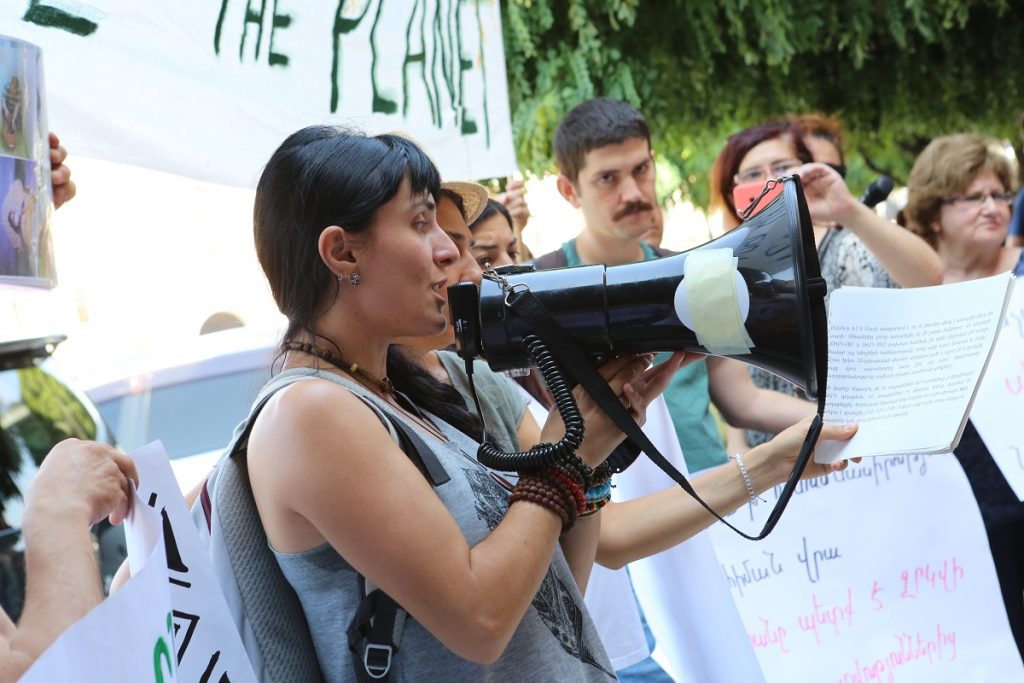Pashinyan's powder keg – why the Armenian gov’t can’t solve the issue of the Amulsar goldmine
The issue of the Amulsar gold mine can be compared with the Nagorno-Karabakh conflict.
Both situations are in a state of uneasy status-quo, which cannot change for the better. The government of Armenia prefers not to rock the boat in either case, possibly hoping that the problems will just take care of themselves.
But whereas Nagorno-Karabakh is a conflict with an outside opponent, and the entire population of the country is on board with the government, Amulsar, on the other hand, has become something of a festering sore for Nikol Pashinyan’s government.
Activists and ecologists have criticised the prime minister for his unwillingness to address the issue. Lydian Armenia, the company which won the right to exploit the mine, has not yet openly blamed the government. However, it is clear that there is growing dissatisfaction among them as well.
● Armenian PM says Amulsar gold mine exploitation will proceed – regardless of environmental concerns
● Company claiming Armenian gold mine safe for exploitation says another study needed
New snags
While the higher-ups keep silent, Lydian Armenia have taken the situation into their own hands and shook up the status-quo on their own initiative.
A significant part of the area around the mountain is covered with tiny mobile homes, where activists have been living for several months. They have blocked off all access to the mountain, making it impossible for heavy machinery to get to the mine.
The company’s security force towed away those mobile homes and set up their own, which led to clashes between the two sides, ultimately requiring the intervention of the police. Dozens of citizens were arrested, and the situation only settled down once Lydian Armenian’s mobile homes were removed from the area.
This recent escalation in the situation was utterly fruitless for both sides, but its significance lies rather in marking that the fight for Amulsar will continue.

The activists’ position
Several parties have a horse in this race. Those who are against the mine include the ecologists and some of those living near the mountain. These are first and foremost the inhabitants of the resort city Jermuk, a place famous for its mineral waters, hot springs and waterfalls.
Jermuk has long been one of the most popular resorts in Armenia. The activists say that having an active gold mine only a few kilometres from the city will tank its tourist potential and do irreversible damage to the environment.
Shirak Buniatyan, a resident of Jermuk, has been protesting the mine for a few years now. After the last, in his words “provocation” with the mobile homes, he and some other like-minded people organised various kinds of protests, including a convey from Jermuk to the ministry of the environment. Shirak says if the government won’t listen to him, then he’ll start fighting in a different way.
«We won’t let them destroy Amulsar. We’re calling on them to listen to us. Otherwise this convey will just be the start of our civil disobedience.
I wish the government had the will to solve this problem. We are ready to resist. We’ve already gotten to the point where we’re tired of the government’s empty words, because they don’t mean anything”.

Is the mining dangerous?
In 2018, and investigative committee in Armenia opened a case on suspicion of environmental damage. International experts were to answer all the questions.
The company chosen to do the investigation was ELARD (Earth Link & Advanced Resources Development), a Lebanese company which spent a year determining the effect of gold mining on the environment.
In the end, a report was published by the group of experts, concluding that the mining of the Amulsar gold fields would not constitute and “unreasonable risk” for the environment.
However, protests continued, and so did Armenia’s consultations with experts.
Then, suddenly, ELARD announced that they would need to do a new study.
“In point of fact, the measures taken by Lydian company were insufficient. We need to look over the amount of effect it will have on the environment again”, said Ricardo Khuri, project manager.
● Environmental protest in Armenian turning into political stand-off
It came out that the consulting company had used research conducted by the local businesses themselves, without doing any new research of its own. One of those structures, as Ricardo Khuri stated, was regarded by the company’s researchers as demonstrating the many deficiencies in the research data they had received.
In fact, ELARD’s conclusions had shined no light on the matter of whether the mining was safe or not, while still costing the country 400 thousand dollars. The company expressed a willingness to submit a new report for an additional fee, but the government would not pay for it.
The Greens, on the other hand, stated that a new report by real experts would need to be prepared on the potential ecological damage of mining the Amulsar gold fields.
“The conclusion of ELARD clearly show that the information provided by Lydian Armenia on possible risks do not allow us to determine the effect of the Amulsar project on the environment. Therefore, we need new data”, said the ecologist Levon Halstyan.
The Amulsar mine is located in the Arpa and Vorotan river valleys. Ecologists warn that mining gold will pollute the rivers. This, in turn, will have an effect on the ecosystem of Lake Sevan, the largest freshwater lake, which both of those rivers flow into. Irreversible damage would also be done to the mineral resources of Jermuk.
The problem is that extracting the precious metal from the ores would require the use of cyanide.
Are all the inhabitants against the mine?
It’s common to think in Armenia that the vast majority of the inhabitants of Jermuk and the surrounding areas are against gold mining in Amulsar. However, Lydian Armenia states that the protests have been paid for, even though the activists’ and ecologists’ actions are illegal.
The heads of the company assert that hundreds of people are interested in the mine, since they need the work.
Anna worked for a mine contracting company. She lives in Gndevaz, a village quite close to the mine.
“The mine has to work. I don’t see any problems. There’s no reason to stop the program. They did the research, and it says that Amulsar isn’t connected to the aquifers of Jermuk”.
Anna confirms that that few people in her village are willing to openly support her position, because of “the atmosphere of fear”.
«Those who support the mine get attacked by the activists. They yell at them on the streets. They always feel that pressure. People who worked in the mine got paid a lot. Now they sit in the streets with nothing to do”.

Why the mine is important for Armenia
Lydian Armenia discovered the gold mine in 2005. Its fields contain 40 tons of pure gold.
The company was seeking investors and developing a plan for the mine until 2012. In the same year Lydian Armenia signed a contract with the Armenian government on mining the fields, obtaining the right to open a mine.
The Amulsar mine is considered to be one of the most promising investment opportunities in independent Armenia. According to some estimates, Lydian has already invested 400 million dollars, without even starting to mine any gold. If the project ever starts, it will have an appreciable effect on the Armenian economy.
The ministry of economy estimates that the total production in the first years would be about 250 million dollars. That means that the mine could raise the GDP by 1 to 1.4 percent in the first year.
This is all the more true considering that the investment into Amulsar is all from abroad. Lydian Armenia is a subsidiary of the offshore company Lydian International. If the mine doesn’t start working, that would be a bad sign from Armenia for foreign investors.
Considering that the amount of direct investment has fallen since 2018, it could have a terrible effect on the economy of Armenia, as the Armenian MP in the ruling My Step Alliance, Babken Tunyan, believes.
«This is a terrible signal for potential investors. If they take the decision to close the mine, it would mean that similar decisions could be made for other investments. Perhaps I’m exaggerating the economic risks. But for me, right now, those risks are much higher and much more predictable than any ecological risks”.
Lydian Armenia retains the right to have the issue decided by the courts using international arbitration. However, it’s still not clear if there’s any legal basis for that.
The human rights activist Nazeli Vardanyan suggests that the company has no such right, since they are an offshore company.
“Lydian International, registered as it is as an offshore company in the British Virgin Isles, can not demand that the Armenian-British agreement on the rights of investors be observed, since the agreement does not apply in offshore zones. As such, after the road to Amulsar was blocked, Lydian set up two companies, one in Britain and one in Canada, through which it informed the government of its intentions. However, the legally valid time period for bringing a lawsuit has already passed”.
After the 2018 revolution, the government of Armenia headed by prime minister Nikol Pashinyan was actively pursuing a resolution to the Amulsar issue. It seemed like they had finally reached the end of this long dispute. Experts asserted that the government had unprecedented public support.
However, after two years the government has become largely silent on the matter. At the beginning of the year Pashinyan stated strictly that the road to mountain must be unblocked, but now there is nearly no word on the Amulsar issue at all. But each side still takes the opportunity, every once in a while, to try and tip the scales back in their favour.



















